Psychological Theories and Research in Health and Social Care
VerifiedAdded on 2023/01/04
|8
|2628
|29
Essay
AI Summary
This essay delves into the application of psychology within health and social care contexts, focusing on developmental psychology theories and their practical implications. It explores key concepts such as Jean Piaget's and Erik Erikson's theories of development, examining the stages of human development from infancy to adulthood. The essay also discusses the impact of these theories on understanding cognitive, social, and emotional development, with particular attention to research studies in health and social care settings, including the care of individuals with dementia. It highlights the importance of understanding psychological principles for effective care provision, referencing studies on patient safety and social engagement within the context of health and social care practices. The essay concludes by synthesizing the information and emphasizing the importance of psychological knowledge in improving patient outcomes and the overall quality of care.
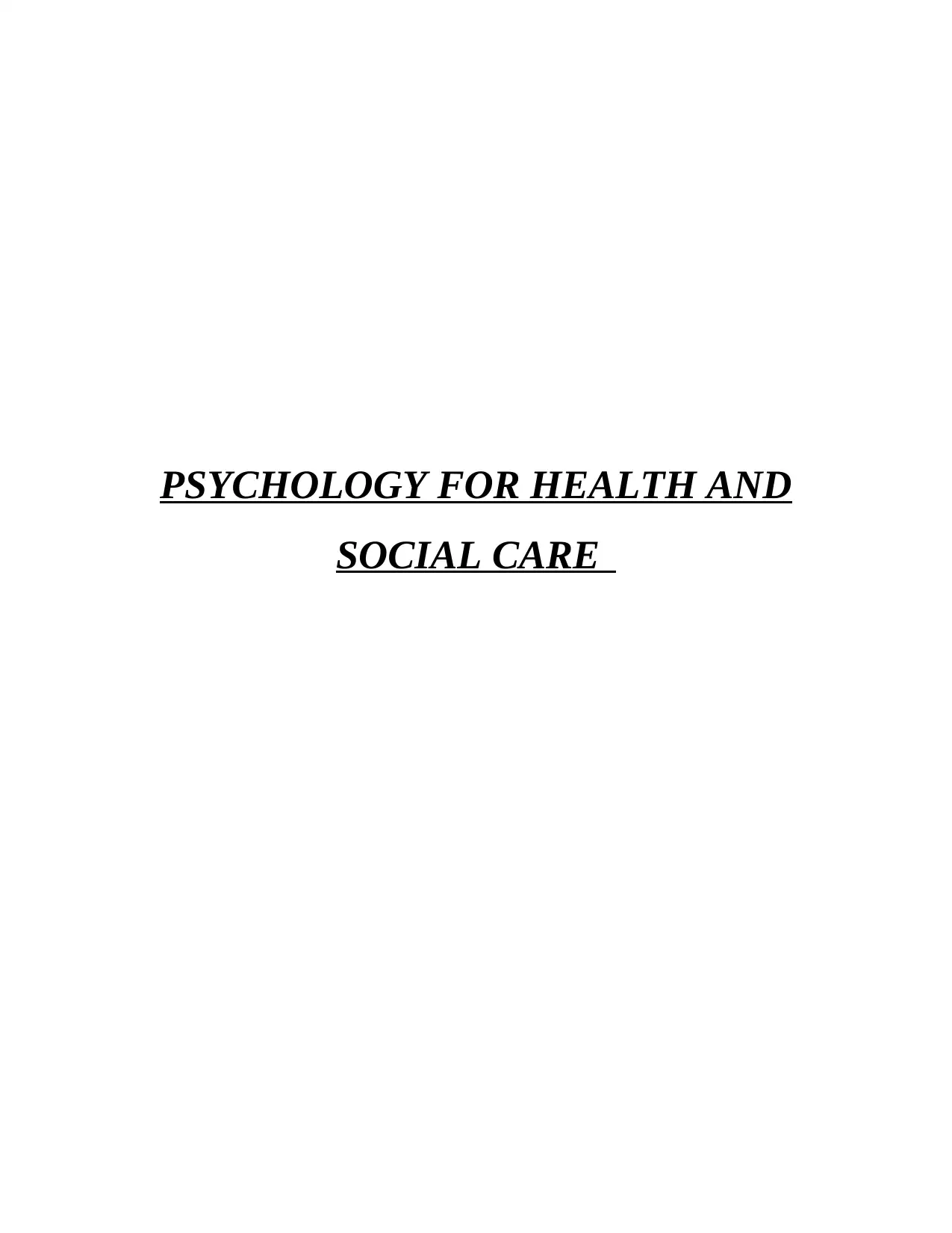
PSYCHOLOGY FOR HEALTH AND
SOCIAL CARE
SOCIAL CARE
Paraphrase This Document
Need a fresh take? Get an instant paraphrase of this document with our AI Paraphraser

Table of Contents
INTRODUCTION...........................................................................................................................3
MAIN BODY...................................................................................................................................3
CONCLUSION................................................................................................................................7
REFERENCES................................................................................................................................8
INTRODUCTION...........................................................................................................................3
MAIN BODY...................................................................................................................................3
CONCLUSION................................................................................................................................7
REFERENCES................................................................................................................................8
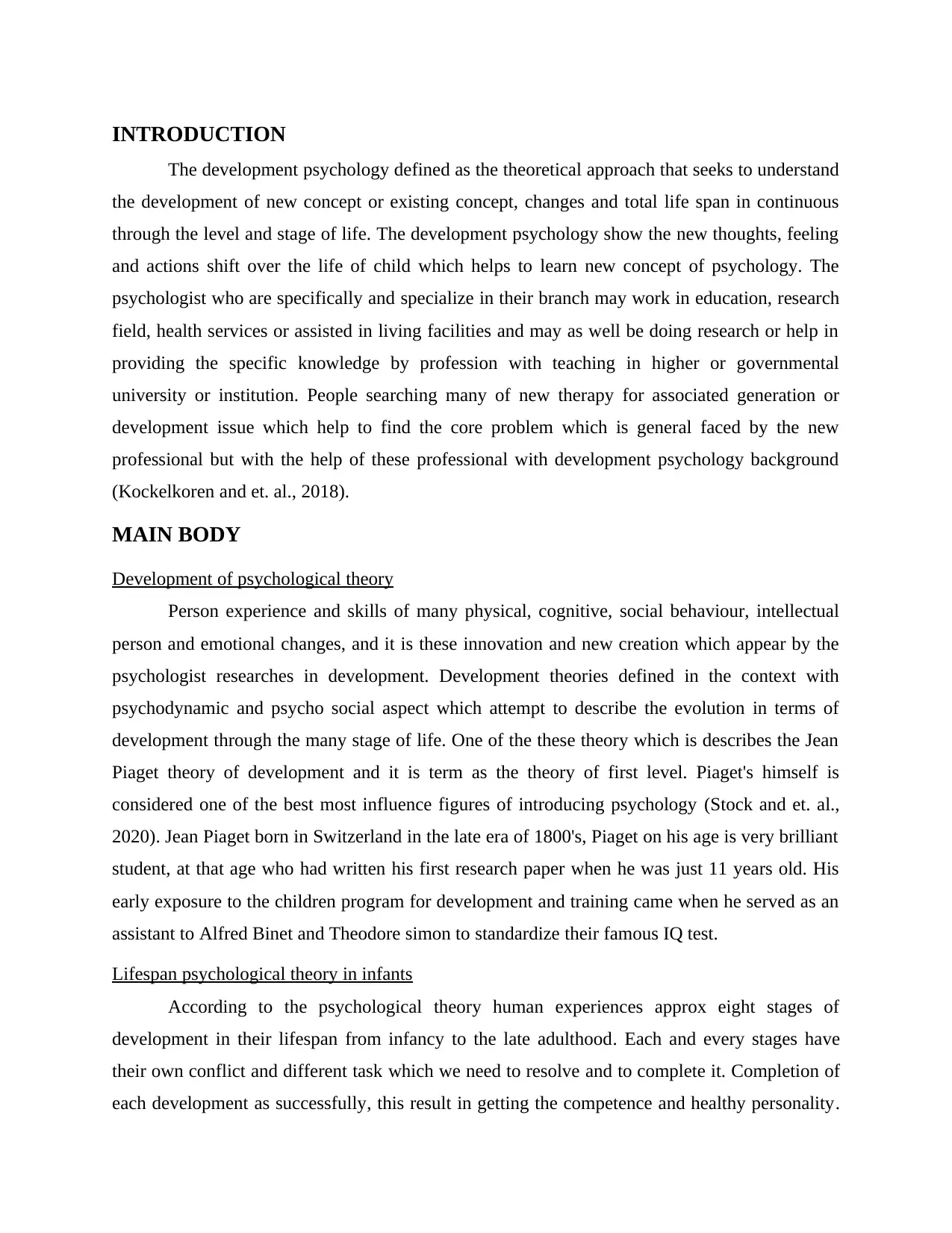
INTRODUCTION
The development psychology defined as the theoretical approach that seeks to understand
the development of new concept or existing concept, changes and total life span in continuous
through the level and stage of life. The development psychology show the new thoughts, feeling
and actions shift over the life of child which helps to learn new concept of psychology. The
psychologist who are specifically and specialize in their branch may work in education, research
field, health services or assisted in living facilities and may as well be doing research or help in
providing the specific knowledge by profession with teaching in higher or governmental
university or institution. People searching many of new therapy for associated generation or
development issue which help to find the core problem which is general faced by the new
professional but with the help of these professional with development psychology background
(Kockelkoren and et. al., 2018).
MAIN BODY
Development of psychological theory
Person experience and skills of many physical, cognitive, social behaviour, intellectual
person and emotional changes, and it is these innovation and new creation which appear by the
psychologist researches in development. Development theories defined in the context with
psychodynamic and psycho social aspect which attempt to describe the evolution in terms of
development through the many stage of life. One of the these theory which is describes the Jean
Piaget theory of development and it is term as the theory of first level. Piaget's himself is
considered one of the best most influence figures of introducing psychology (Stock and et. al.,
2020). Jean Piaget born in Switzerland in the late era of 1800's, Piaget on his age is very brilliant
student, at that age who had written his first research paper when he was just 11 years old. His
early exposure to the children program for development and training came when he served as an
assistant to Alfred Binet and Theodore simon to standardize their famous IQ test.
Lifespan psychological theory in infants
According to the psychological theory human experiences approx eight stages of
development in their lifespan from infancy to the late adulthood. Each and every stages have
their own conflict and different task which we need to resolve and to complete it. Completion of
each development as successfully, this result in getting the competence and healthy personality.
The development psychology defined as the theoretical approach that seeks to understand
the development of new concept or existing concept, changes and total life span in continuous
through the level and stage of life. The development psychology show the new thoughts, feeling
and actions shift over the life of child which helps to learn new concept of psychology. The
psychologist who are specifically and specialize in their branch may work in education, research
field, health services or assisted in living facilities and may as well be doing research or help in
providing the specific knowledge by profession with teaching in higher or governmental
university or institution. People searching many of new therapy for associated generation or
development issue which help to find the core problem which is general faced by the new
professional but with the help of these professional with development psychology background
(Kockelkoren and et. al., 2018).
MAIN BODY
Development of psychological theory
Person experience and skills of many physical, cognitive, social behaviour, intellectual
person and emotional changes, and it is these innovation and new creation which appear by the
psychologist researches in development. Development theories defined in the context with
psychodynamic and psycho social aspect which attempt to describe the evolution in terms of
development through the many stage of life. One of the these theory which is describes the Jean
Piaget theory of development and it is term as the theory of first level. Piaget's himself is
considered one of the best most influence figures of introducing psychology (Stock and et. al.,
2020). Jean Piaget born in Switzerland in the late era of 1800's, Piaget on his age is very brilliant
student, at that age who had written his first research paper when he was just 11 years old. His
early exposure to the children program for development and training came when he served as an
assistant to Alfred Binet and Theodore simon to standardize their famous IQ test.
Lifespan psychological theory in infants
According to the psychological theory human experiences approx eight stages of
development in their lifespan from infancy to the late adulthood. Each and every stages have
their own conflict and different task which we need to resolve and to complete it. Completion of
each development as successfully, this result in getting the competence and healthy personality.
⊘ This is a preview!⊘
Do you want full access?
Subscribe today to unlock all pages.

Trusted by 1+ million students worldwide
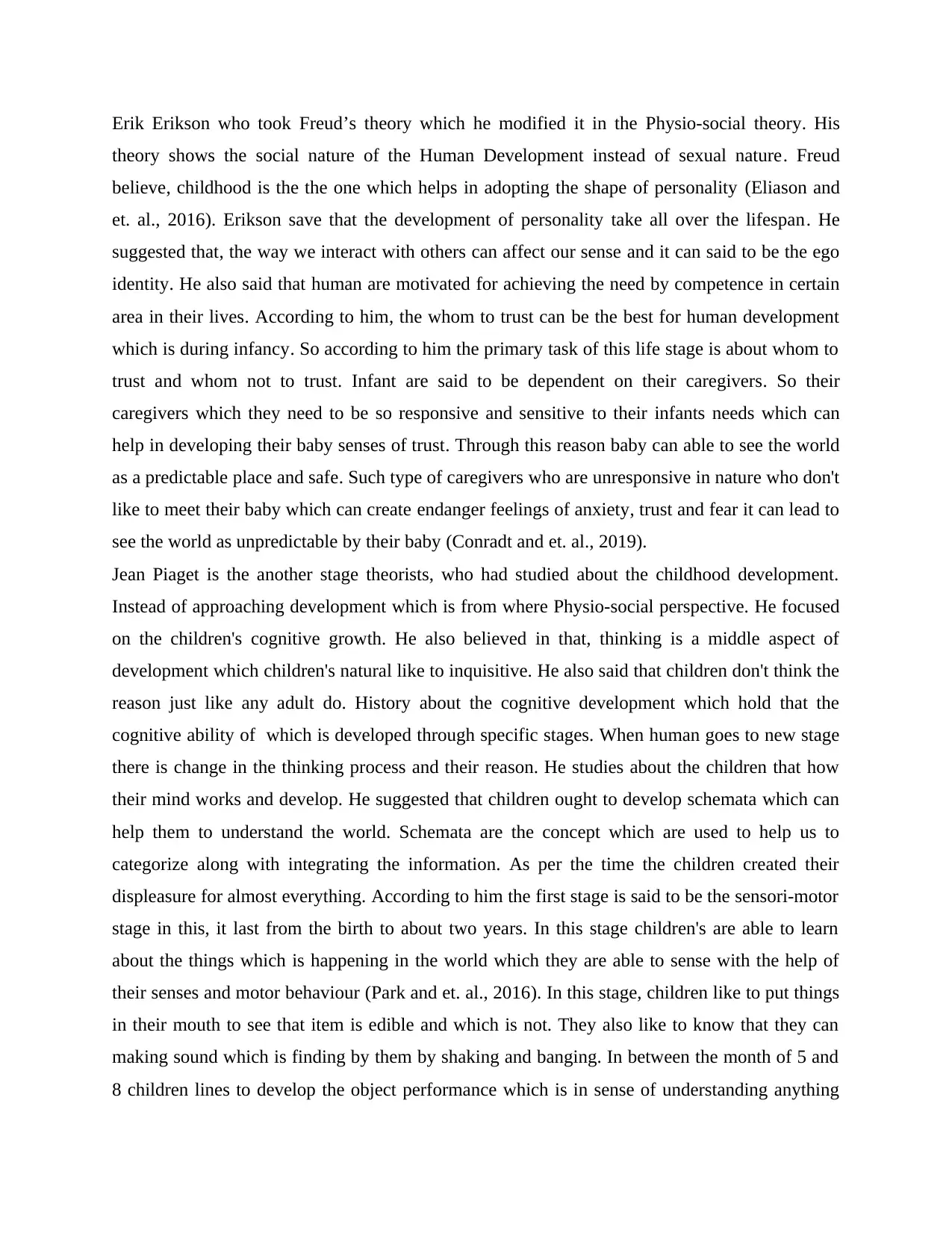
Erik Erikson who took Freud’s theory which he modified it in the Physio-social theory. His
theory shows the social nature of the Human Development instead of sexual nature. Freud
believe, childhood is the the one which helps in adopting the shape of personality (Eliason and
et. al., 2016). Erikson save that the development of personality take all over the lifespan. He
suggested that, the way we interact with others can affect our sense and it can said to be the ego
identity. He also said that human are motivated for achieving the need by competence in certain
area in their lives. According to him, the whom to trust can be the best for human development
which is during infancy. So according to him the primary task of this life stage is about whom to
trust and whom not to trust. Infant are said to be dependent on their caregivers. So their
caregivers which they need to be so responsive and sensitive to their infants needs which can
help in developing their baby senses of trust. Through this reason baby can able to see the world
as a predictable place and safe. Such type of caregivers who are unresponsive in nature who don't
like to meet their baby which can create endanger feelings of anxiety, trust and fear it can lead to
see the world as unpredictable by their baby (Conradt and et. al., 2019).
Jean Piaget is the another stage theorists, who had studied about the childhood development.
Instead of approaching development which is from where Physio-social perspective. He focused
on the children's cognitive growth. He also believed in that, thinking is a middle aspect of
development which children's natural like to inquisitive. He also said that children don't think the
reason just like any adult do. History about the cognitive development which hold that the
cognitive ability of which is developed through specific stages. When human goes to new stage
there is change in the thinking process and their reason. He studies about the children that how
their mind works and develop. He suggested that children ought to develop schemata which can
help them to understand the world. Schemata are the concept which are used to help us to
categorize along with integrating the information. As per the time the children created their
displeasure for almost everything. According to him the first stage is said to be the sensori-motor
stage in this, it last from the birth to about two years. In this stage children's are able to learn
about the things which is happening in the world which they are able to sense with the help of
their senses and motor behaviour (Park and et. al., 2016). In this stage, children like to put things
in their mouth to see that item is edible and which is not. They also like to know that they can
making sound which is finding by them by shaking and banging. In between the month of 5 and
8 children lines to develop the object performance which is in sense of understanding anything
theory shows the social nature of the Human Development instead of sexual nature. Freud
believe, childhood is the the one which helps in adopting the shape of personality (Eliason and
et. al., 2016). Erikson save that the development of personality take all over the lifespan. He
suggested that, the way we interact with others can affect our sense and it can said to be the ego
identity. He also said that human are motivated for achieving the need by competence in certain
area in their lives. According to him, the whom to trust can be the best for human development
which is during infancy. So according to him the primary task of this life stage is about whom to
trust and whom not to trust. Infant are said to be dependent on their caregivers. So their
caregivers which they need to be so responsive and sensitive to their infants needs which can
help in developing their baby senses of trust. Through this reason baby can able to see the world
as a predictable place and safe. Such type of caregivers who are unresponsive in nature who don't
like to meet their baby which can create endanger feelings of anxiety, trust and fear it can lead to
see the world as unpredictable by their baby (Conradt and et. al., 2019).
Jean Piaget is the another stage theorists, who had studied about the childhood development.
Instead of approaching development which is from where Physio-social perspective. He focused
on the children's cognitive growth. He also believed in that, thinking is a middle aspect of
development which children's natural like to inquisitive. He also said that children don't think the
reason just like any adult do. History about the cognitive development which hold that the
cognitive ability of which is developed through specific stages. When human goes to new stage
there is change in the thinking process and their reason. He studies about the children that how
their mind works and develop. He suggested that children ought to develop schemata which can
help them to understand the world. Schemata are the concept which are used to help us to
categorize along with integrating the information. As per the time the children created their
displeasure for almost everything. According to him the first stage is said to be the sensori-motor
stage in this, it last from the birth to about two years. In this stage children's are able to learn
about the things which is happening in the world which they are able to sense with the help of
their senses and motor behaviour (Park and et. al., 2016). In this stage, children like to put things
in their mouth to see that item is edible and which is not. They also like to know that they can
making sound which is finding by them by shaking and banging. In between the month of 5 and
8 children lines to develop the object performance which is in sense of understanding anything
Paraphrase This Document
Need a fresh take? Get an instant paraphrase of this document with our AI Paraphraser
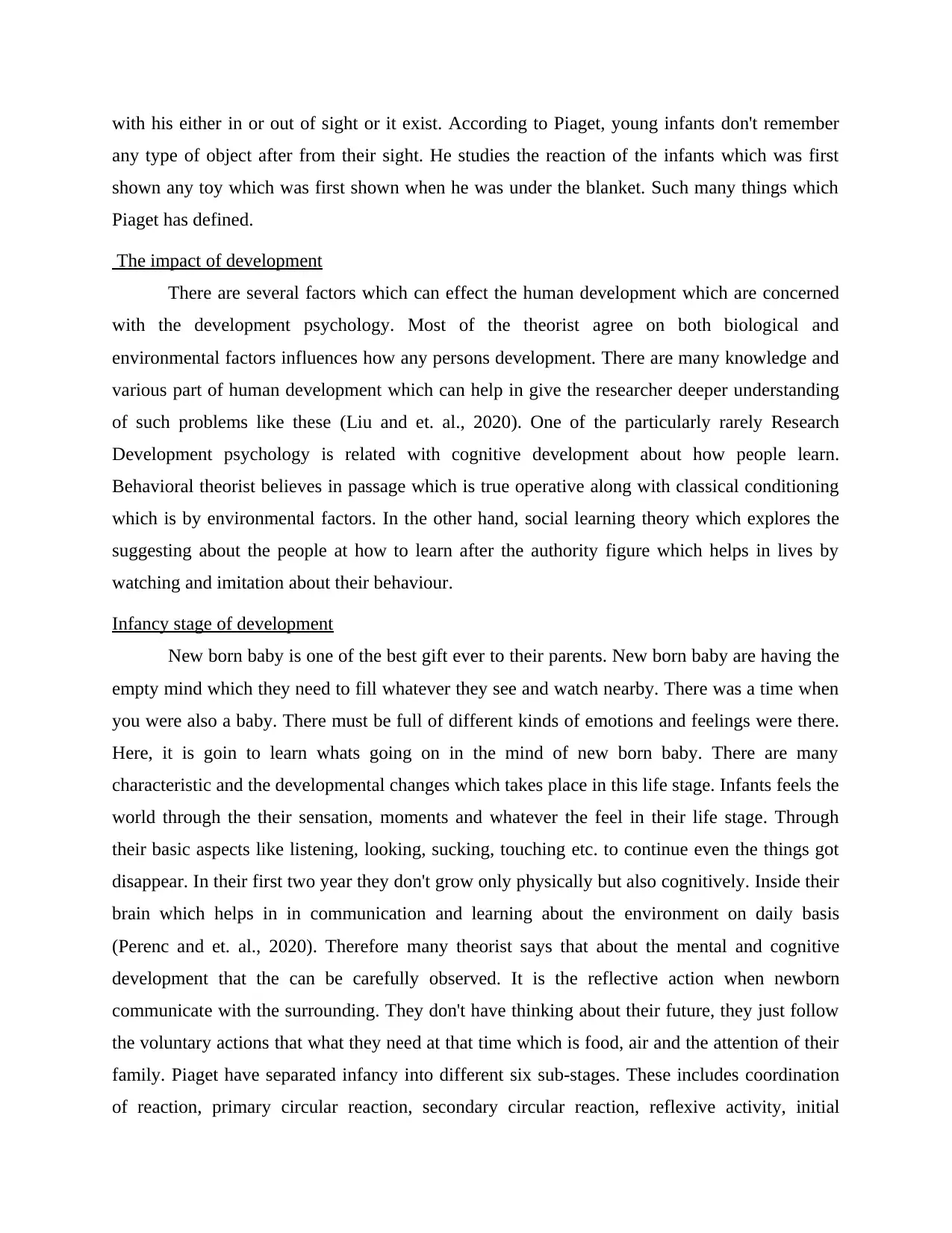
with his either in or out of sight or it exist. According to Piaget, young infants don't remember
any type of object after from their sight. He studies the reaction of the infants which was first
shown any toy which was first shown when he was under the blanket. Such many things which
Piaget has defined.
The impact of development
There are several factors which can effect the human development which are concerned
with the development psychology. Most of the theorist agree on both biological and
environmental factors influences how any persons development. There are many knowledge and
various part of human development which can help in give the researcher deeper understanding
of such problems like these (Liu and et. al., 2020). One of the particularly rarely Research
Development psychology is related with cognitive development about how people learn.
Behavioral theorist believes in passage which is true operative along with classical conditioning
which is by environmental factors. In the other hand, social learning theory which explores the
suggesting about the people at how to learn after the authority figure which helps in lives by
watching and imitation about their behaviour.
Infancy stage of development
New born baby is one of the best gift ever to their parents. New born baby are having the
empty mind which they need to fill whatever they see and watch nearby. There was a time when
you were also a baby. There must be full of different kinds of emotions and feelings were there.
Here, it is goin to learn whats going on in the mind of new born baby. There are many
characteristic and the developmental changes which takes place in this life stage. Infants feels the
world through the their sensation, moments and whatever the feel in their life stage. Through
their basic aspects like listening, looking, sucking, touching etc. to continue even the things got
disappear. In their first two year they don't grow only physically but also cognitively. Inside their
brain which helps in in communication and learning about the environment on daily basis
(Perenc and et. al., 2020). Therefore many theorist says that about the mental and cognitive
development that the can be carefully observed. It is the reflective action when newborn
communicate with the surrounding. They don't have thinking about their future, they just follow
the voluntary actions that what they need at that time which is food, air and the attention of their
family. Piaget have separated infancy into different six sub-stages. These includes coordination
of reaction, primary circular reaction, secondary circular reaction, reflexive activity, initial
any type of object after from their sight. He studies the reaction of the infants which was first
shown any toy which was first shown when he was under the blanket. Such many things which
Piaget has defined.
The impact of development
There are several factors which can effect the human development which are concerned
with the development psychology. Most of the theorist agree on both biological and
environmental factors influences how any persons development. There are many knowledge and
various part of human development which can help in give the researcher deeper understanding
of such problems like these (Liu and et. al., 2020). One of the particularly rarely Research
Development psychology is related with cognitive development about how people learn.
Behavioral theorist believes in passage which is true operative along with classical conditioning
which is by environmental factors. In the other hand, social learning theory which explores the
suggesting about the people at how to learn after the authority figure which helps in lives by
watching and imitation about their behaviour.
Infancy stage of development
New born baby is one of the best gift ever to their parents. New born baby are having the
empty mind which they need to fill whatever they see and watch nearby. There was a time when
you were also a baby. There must be full of different kinds of emotions and feelings were there.
Here, it is goin to learn whats going on in the mind of new born baby. There are many
characteristic and the developmental changes which takes place in this life stage. Infants feels the
world through the their sensation, moments and whatever the feel in their life stage. Through
their basic aspects like listening, looking, sucking, touching etc. to continue even the things got
disappear. In their first two year they don't grow only physically but also cognitively. Inside their
brain which helps in in communication and learning about the environment on daily basis
(Perenc and et. al., 2020). Therefore many theorist says that about the mental and cognitive
development that the can be carefully observed. It is the reflective action when newborn
communicate with the surrounding. They don't have thinking about their future, they just follow
the voluntary actions that what they need at that time which is food, air and the attention of their
family. Piaget have separated infancy into different six sub-stages. These includes coordination
of reaction, primary circular reaction, secondary circular reaction, reflexive activity, initial
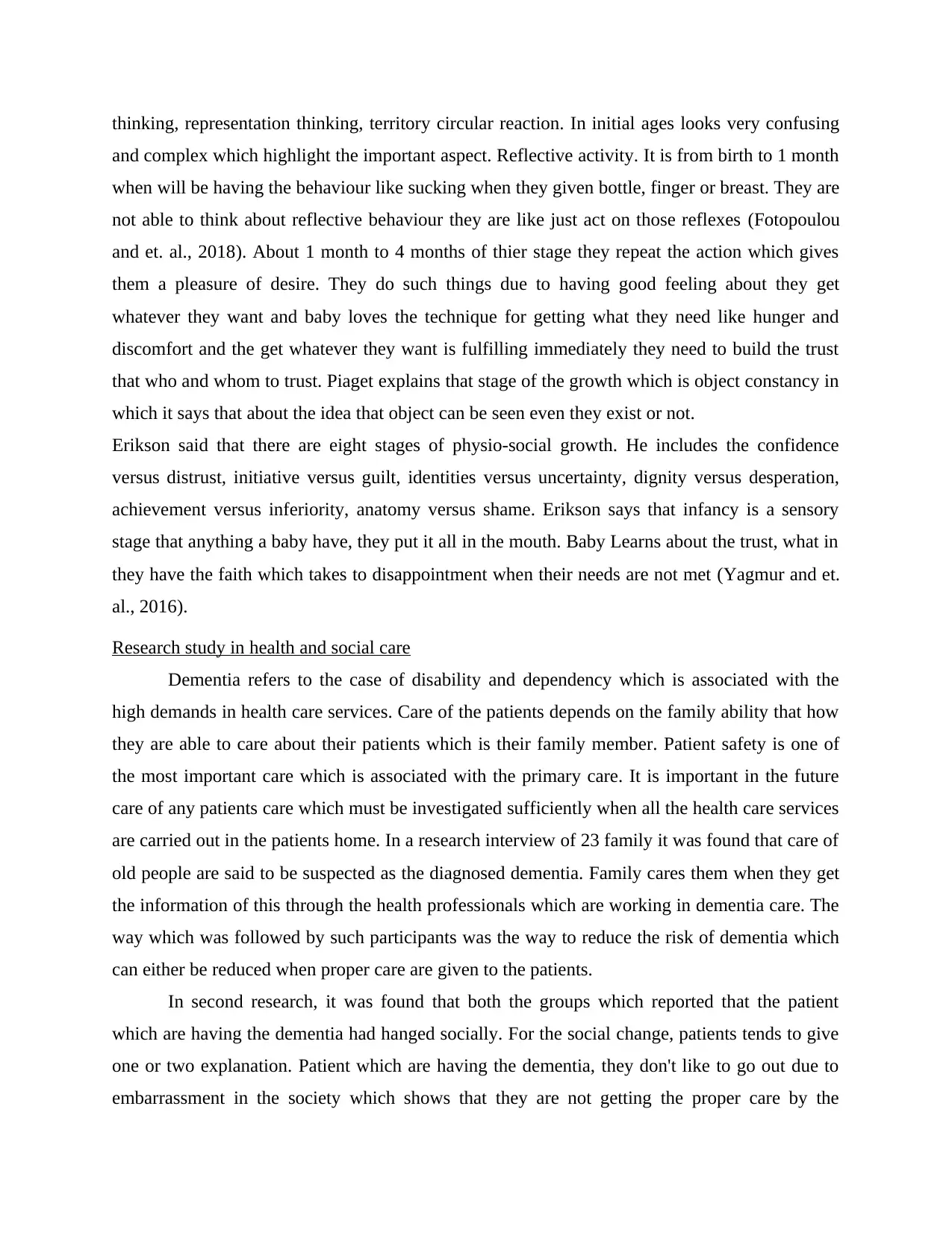
thinking, representation thinking, territory circular reaction. In initial ages looks very confusing
and complex which highlight the important aspect. Reflective activity. It is from birth to 1 month
when will be having the behaviour like sucking when they given bottle, finger or breast. They are
not able to think about reflective behaviour they are like just act on those reflexes (Fotopoulou
and et. al., 2018). About 1 month to 4 months of thier stage they repeat the action which gives
them a pleasure of desire. They do such things due to having good feeling about they get
whatever they want and baby loves the technique for getting what they need like hunger and
discomfort and the get whatever they want is fulfilling immediately they need to build the trust
that who and whom to trust. Piaget explains that stage of the growth which is object constancy in
which it says that about the idea that object can be seen even they exist or not.
Erikson said that there are eight stages of physio-social growth. He includes the confidence
versus distrust, initiative versus guilt, identities versus uncertainty, dignity versus desperation,
achievement versus inferiority, anatomy versus shame. Erikson says that infancy is a sensory
stage that anything a baby have, they put it all in the mouth. Baby Learns about the trust, what in
they have the faith which takes to disappointment when their needs are not met (Yagmur and et.
al., 2016).
Research study in health and social care
Dementia refers to the case of disability and dependency which is associated with the
high demands in health care services. Care of the patients depends on the family ability that how
they are able to care about their patients which is their family member. Patient safety is one of
the most important care which is associated with the primary care. It is important in the future
care of any patients care which must be investigated sufficiently when all the health care services
are carried out in the patients home. In a research interview of 23 family it was found that care of
old people are said to be suspected as the diagnosed dementia. Family cares them when they get
the information of this through the health professionals which are working in dementia care. The
way which was followed by such participants was the way to reduce the risk of dementia which
can either be reduced when proper care are given to the patients.
In second research, it was found that both the groups which reported that the patient
which are having the dementia had hanged socially. For the social change, patients tends to give
one or two explanation. Patient which are having the dementia, they don't like to go out due to
embarrassment in the society which shows that they are not getting the proper care by the
and complex which highlight the important aspect. Reflective activity. It is from birth to 1 month
when will be having the behaviour like sucking when they given bottle, finger or breast. They are
not able to think about reflective behaviour they are like just act on those reflexes (Fotopoulou
and et. al., 2018). About 1 month to 4 months of thier stage they repeat the action which gives
them a pleasure of desire. They do such things due to having good feeling about they get
whatever they want and baby loves the technique for getting what they need like hunger and
discomfort and the get whatever they want is fulfilling immediately they need to build the trust
that who and whom to trust. Piaget explains that stage of the growth which is object constancy in
which it says that about the idea that object can be seen even they exist or not.
Erikson said that there are eight stages of physio-social growth. He includes the confidence
versus distrust, initiative versus guilt, identities versus uncertainty, dignity versus desperation,
achievement versus inferiority, anatomy versus shame. Erikson says that infancy is a sensory
stage that anything a baby have, they put it all in the mouth. Baby Learns about the trust, what in
they have the faith which takes to disappointment when their needs are not met (Yagmur and et.
al., 2016).
Research study in health and social care
Dementia refers to the case of disability and dependency which is associated with the
high demands in health care services. Care of the patients depends on the family ability that how
they are able to care about their patients which is their family member. Patient safety is one of
the most important care which is associated with the primary care. It is important in the future
care of any patients care which must be investigated sufficiently when all the health care services
are carried out in the patients home. In a research interview of 23 family it was found that care of
old people are said to be suspected as the diagnosed dementia. Family cares them when they get
the information of this through the health professionals which are working in dementia care. The
way which was followed by such participants was the way to reduce the risk of dementia which
can either be reduced when proper care are given to the patients.
In second research, it was found that both the groups which reported that the patient
which are having the dementia had hanged socially. For the social change, patients tends to give
one or two explanation. Patient which are having the dementia, they don't like to go out due to
embarrassment in the society which shows that they are not getting the proper care by the
⊘ This is a preview!⊘
Do you want full access?
Subscribe today to unlock all pages.

Trusted by 1+ million students worldwide
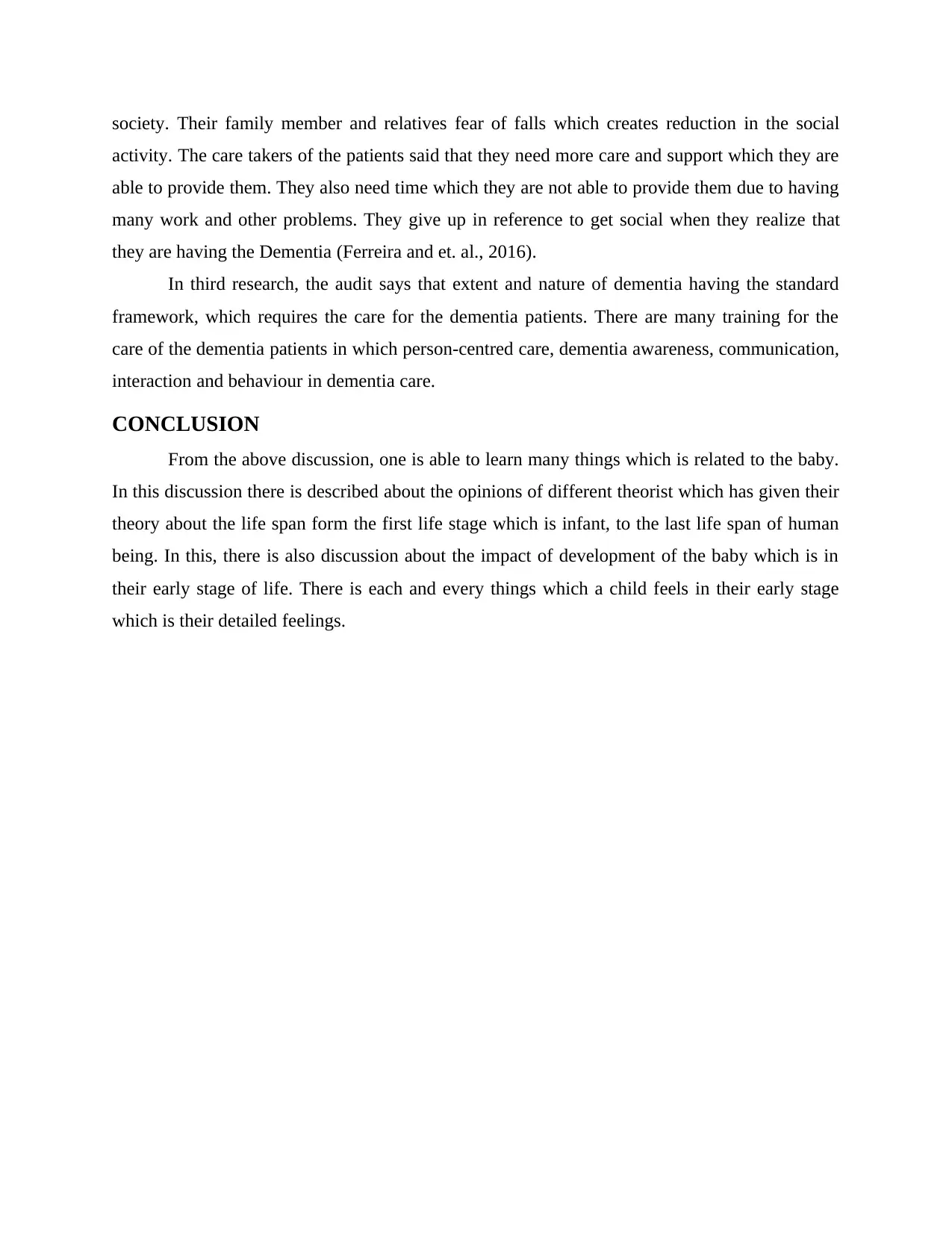
society. Their family member and relatives fear of falls which creates reduction in the social
activity. The care takers of the patients said that they need more care and support which they are
able to provide them. They also need time which they are not able to provide them due to having
many work and other problems. They give up in reference to get social when they realize that
they are having the Dementia (Ferreira and et. al., 2016).
In third research, the audit says that extent and nature of dementia having the standard
framework, which requires the care for the dementia patients. There are many training for the
care of the dementia patients in which person-centred care, dementia awareness, communication,
interaction and behaviour in dementia care.
CONCLUSION
From the above discussion, one is able to learn many things which is related to the baby.
In this discussion there is described about the opinions of different theorist which has given their
theory about the life span form the first life stage which is infant, to the last life span of human
being. In this, there is also discussion about the impact of development of the baby which is in
their early stage of life. There is each and every things which a child feels in their early stage
which is their detailed feelings.
activity. The care takers of the patients said that they need more care and support which they are
able to provide them. They also need time which they are not able to provide them due to having
many work and other problems. They give up in reference to get social when they realize that
they are having the Dementia (Ferreira and et. al., 2016).
In third research, the audit says that extent and nature of dementia having the standard
framework, which requires the care for the dementia patients. There are many training for the
care of the dementia patients in which person-centred care, dementia awareness, communication,
interaction and behaviour in dementia care.
CONCLUSION
From the above discussion, one is able to learn many things which is related to the baby.
In this discussion there is described about the opinions of different theorist which has given their
theory about the life span form the first life stage which is infant, to the last life span of human
being. In this, there is also discussion about the impact of development of the baby which is in
their early stage of life. There is each and every things which a child feels in their early stage
which is their detailed feelings.
Paraphrase This Document
Need a fresh take? Get an instant paraphrase of this document with our AI Paraphraser
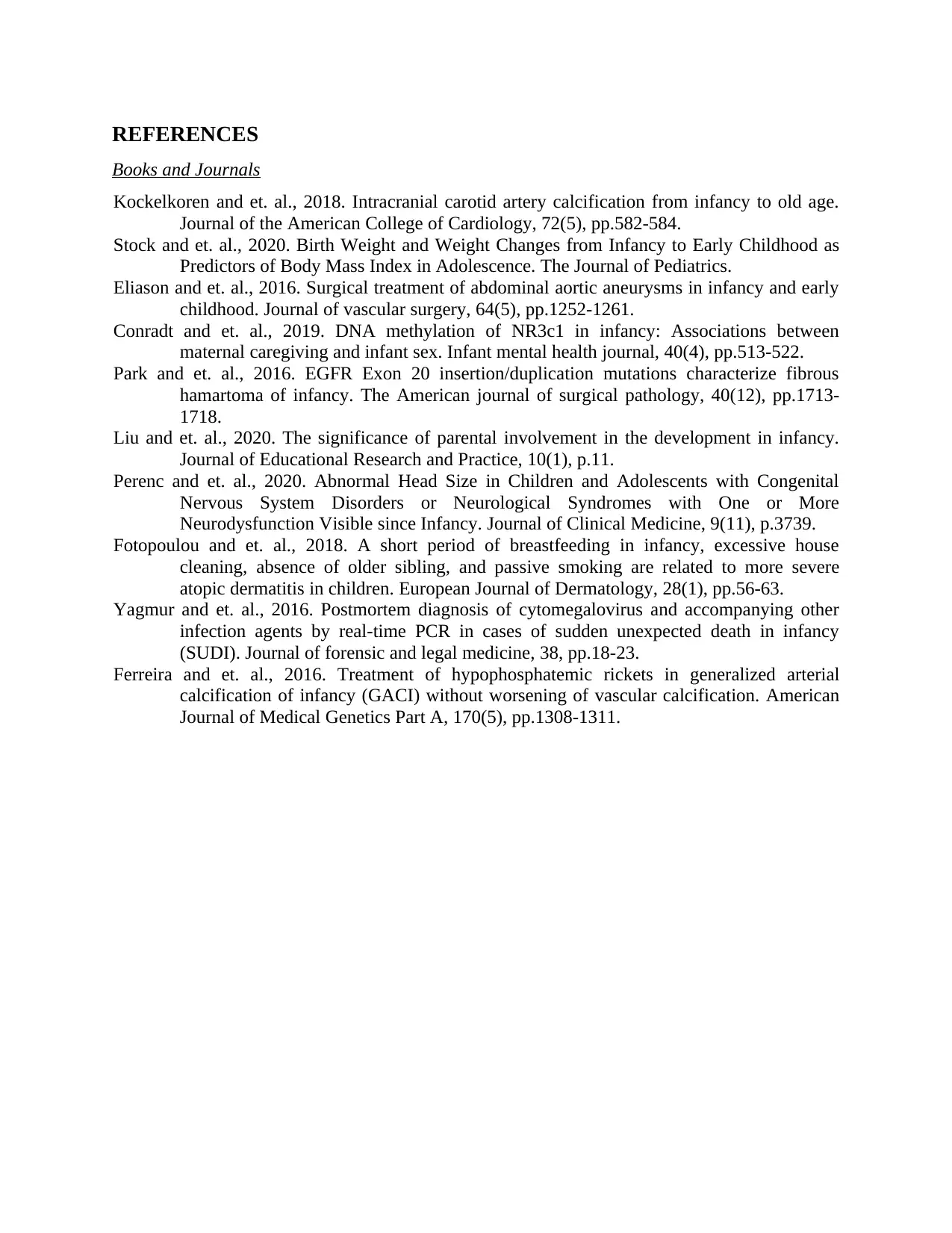
REFERENCES
Books and Journals
Kockelkoren and et. al., 2018. Intracranial carotid artery calcification from infancy to old age.
Journal of the American College of Cardiology, 72(5), pp.582-584.
Stock and et. al., 2020. Birth Weight and Weight Changes from Infancy to Early Childhood as
Predictors of Body Mass Index in Adolescence. The Journal of Pediatrics.
Eliason and et. al., 2016. Surgical treatment of abdominal aortic aneurysms in infancy and early
childhood. Journal of vascular surgery, 64(5), pp.1252-1261.
Conradt and et. al., 2019. DNA methylation of NR3c1 in infancy: Associations between
maternal caregiving and infant sex. Infant mental health journal, 40(4), pp.513-522.
Park and et. al., 2016. EGFR Exon 20 insertion/duplication mutations characterize fibrous
hamartoma of infancy. The American journal of surgical pathology, 40(12), pp.1713-
1718.
Liu and et. al., 2020. The significance of parental involvement in the development in infancy.
Journal of Educational Research and Practice, 10(1), p.11.
Perenc and et. al., 2020. Abnormal Head Size in Children and Adolescents with Congenital
Nervous System Disorders or Neurological Syndromes with One or More
Neurodysfunction Visible since Infancy. Journal of Clinical Medicine, 9(11), p.3739.
Fotopoulou and et. al., 2018. A short period of breastfeeding in infancy, excessive house
cleaning, absence of older sibling, and passive smoking are related to more severe
atopic dermatitis in children. European Journal of Dermatology, 28(1), pp.56-63.
Yagmur and et. al., 2016. Postmortem diagnosis of cytomegalovirus and accompanying other
infection agents by real-time PCR in cases of sudden unexpected death in infancy
(SUDI). Journal of forensic and legal medicine, 38, pp.18-23.
Ferreira and et. al., 2016. Treatment of hypophosphatemic rickets in generalized arterial
calcification of infancy (GACI) without worsening of vascular calcification. American
Journal of Medical Genetics Part A, 170(5), pp.1308-1311.
Books and Journals
Kockelkoren and et. al., 2018. Intracranial carotid artery calcification from infancy to old age.
Journal of the American College of Cardiology, 72(5), pp.582-584.
Stock and et. al., 2020. Birth Weight and Weight Changes from Infancy to Early Childhood as
Predictors of Body Mass Index in Adolescence. The Journal of Pediatrics.
Eliason and et. al., 2016. Surgical treatment of abdominal aortic aneurysms in infancy and early
childhood. Journal of vascular surgery, 64(5), pp.1252-1261.
Conradt and et. al., 2019. DNA methylation of NR3c1 in infancy: Associations between
maternal caregiving and infant sex. Infant mental health journal, 40(4), pp.513-522.
Park and et. al., 2016. EGFR Exon 20 insertion/duplication mutations characterize fibrous
hamartoma of infancy. The American journal of surgical pathology, 40(12), pp.1713-
1718.
Liu and et. al., 2020. The significance of parental involvement in the development in infancy.
Journal of Educational Research and Practice, 10(1), p.11.
Perenc and et. al., 2020. Abnormal Head Size in Children and Adolescents with Congenital
Nervous System Disorders or Neurological Syndromes with One or More
Neurodysfunction Visible since Infancy. Journal of Clinical Medicine, 9(11), p.3739.
Fotopoulou and et. al., 2018. A short period of breastfeeding in infancy, excessive house
cleaning, absence of older sibling, and passive smoking are related to more severe
atopic dermatitis in children. European Journal of Dermatology, 28(1), pp.56-63.
Yagmur and et. al., 2016. Postmortem diagnosis of cytomegalovirus and accompanying other
infection agents by real-time PCR in cases of sudden unexpected death in infancy
(SUDI). Journal of forensic and legal medicine, 38, pp.18-23.
Ferreira and et. al., 2016. Treatment of hypophosphatemic rickets in generalized arterial
calcification of infancy (GACI) without worsening of vascular calcification. American
Journal of Medical Genetics Part A, 170(5), pp.1308-1311.
1 out of 8
Related Documents
Your All-in-One AI-Powered Toolkit for Academic Success.
+13062052269
info@desklib.com
Available 24*7 on WhatsApp / Email
![[object Object]](/_next/static/media/star-bottom.7253800d.svg)
Unlock your academic potential
Copyright © 2020–2026 A2Z Services. All Rights Reserved. Developed and managed by ZUCOL.




